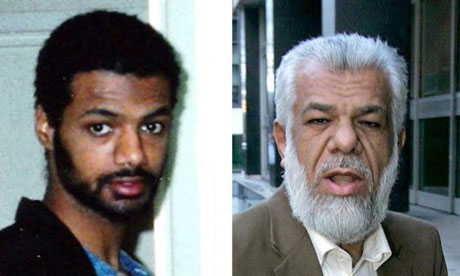Torture prosecutions against MI5 and MI6 unlikely to be pursued
Police inquiry expected to say intelligence agents should not be charged over collusion in torture of terror suspects

A three-year police investigation is expected to conclude that senior MI5and MI6 officers should not be prosecuted for colluding in the torture and abuse of terror suspects, the Guardian understands.
A joint statement by the Crown Prosecution Service and the Metropolitan police is expected to say that the two security and intelligence service individuals should not be charged.
The statement, due on Thursday morning, should give a green light to the Gibson inquiry, the judge-led inquiry set by the coalition government more than a year ago to look into MI5 and MI6 involvement in wrongdoing, including co-operation with the CIA.
The Gibson inquiry has been held up pending the police investigations into the MI5 and MI6 oficers.
The announcement comes after human rights campaigners condemned the US government's failure to close the Guantánamo Bay detention camp, 10 years after the arrival of its first inmates.
The foreign secretary, William Hague, has said the government is committed to "drawing a line" under the alleged involvement of intelligence agencies in the torture of terror suspects held overseas.
But human rights groups and lawyers are refusing to give evidence or attend any meetings with the inquiry team, saying it does not have credibility or transparency.
A number of British Muslims have complained they were questioned by agents after being tortured in Pakistan, Bangladesh, Afghanistan and Guantánamo.
Others say they were tortured in places such as Egypt, Dubai, Morocco and Syria, while being interrogated on the basis of information that could only have been supplied by the UK.
In November 2010 the justice secretary, Kenneth Clarke, announced that secret payouts to 16 former detainees at Guantánamo Bay were being made to pave the way for the inquiry into allegations of torture.
Binyam Mohamed, Bishar al-Rawi, Jamil el-Banna, Richard Belmar, Omar Deghayes, Moazzam Begg and Martin Mubanga are said to be among those who received settlements.
Mohamed was granted refugee status in Britain in 1994 after seeking asylum from Ethiopia. He travelled to Pakistan in 2001 – the year he converted to Islam – and was arrested there a year later on suspicion of involvement in terrorism, before being "rendered" to Morocco and Afghanistan.
After being subjected to alleged torture by his US captors, he was sent to Guantánamo Bay in 2004. In October 2008 the US government dropped all charges against him. Mohamed was released and returned to Britain in February 2009.
In November Hague acknowledged Britain's reputation had been damaged by claims that MI5 and MI6 officers were complicit. "The very making of these allegations undermined Britain's standing in the world as a country that upholds international law and abhors torture," he said.
Both the detainee inquiry under Sir Peter Gibson and green paper proposals to enable the greater use of secret intelligence material in court cases have prompted controversy.
Human rights groups have warned the green paper would lead to greater secrecy in the justice system, making it more difficult to hold the authorities to account.

No comments:
Post a Comment